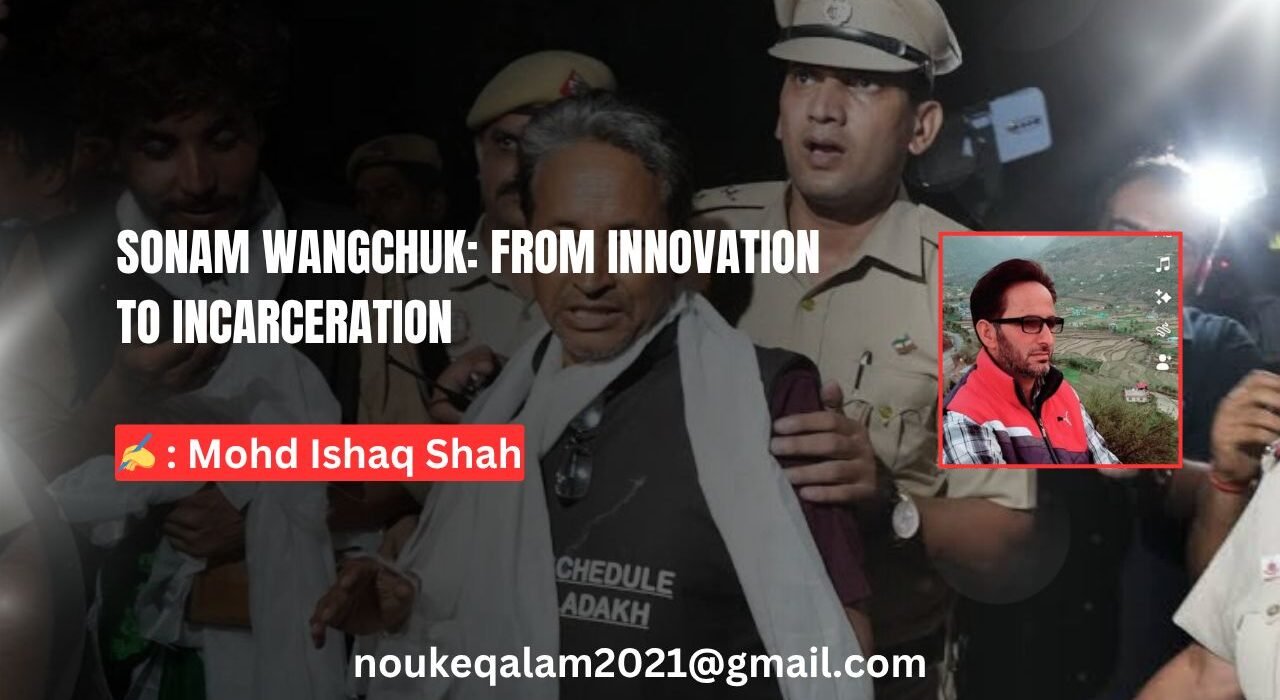✒️:. Mohd Ishaq Shah
I,like almost everybody, was not aware of Sonam Wangchuk until I read about the model behind the famous Bollywood film “Three Idiots.” Sonam Wangchuk was portrayed by Aamir Khan, who played the role of Phunsukh Wangdu in the movie that centered on education with innovation. After watching this film, I felt compelled to know more about this innovative and reformative personality who contributed greatly to humanity in general and to the people of Ladakh in particular.
An engineer by profession, Wangchuk possessed tremendous knowledge of engineering science. The film reflected Aamir Khan in the role of a modern and scientifically driven student who thought out of the box, unlike those bound by the conventional education system that limits children to grades and marks, suppressing hidden potential.
Wangchuk came into the spotlight in 2009, when his story inspired Aamir Khan’s character in 3 Idiots, directed by Rajkumar Hirani. He has often been called “the real-life Phunsukh Wangdu,” although Wangchuk has distanced himself from this comparison.
Before proceeding further, let me highlight some details of his life and career to understand what transformed this innovative man into a prisoner.
Early Life and Education:
Wangchuk was born in 1966 near Alchi in the Leh district of Jammu and Kashmir (now Ladakh). With no schools in his village, he was not enrolled until age nine. His mother taught him the basics in their mother tongue until then. In 1975, when his father became a minister in the J&K Government, Wangchuk was taken to Srinagar and enrolled in a school. There, he was treated poorly due to language barriers, which made his teachers mistakenly consider him unintelligent. He recalls this as the darkest part of his life.
In 1977, unable to bear the treatment, he escaped alone to Delhi and pleaded for admission at Kendriya Vidyalaya. He later completed his B.Tech in Mechanical Engineering from NIT Srinagar in 1987. He financed his own education due to disagreements with his father. In 2011, he pursued higher studies in Earthen Architecture at Craterre School of Architecture in Grenoble, France.
Professional Career:
In 1988, Wangchuk co-founded the Students’ Educational and Cultural Movement of Ladakh (SECMOL). Through this platform, he reformed government schools, launched Operation New Hope, and worked on several education initiatives. He also founded Ladakh’s only print magazine, Ladags Melong. He was involved in drafting Vision Document Ladakh 2025, launched by Prime Minister Manmohan Singh in 2005, and served in various advisory and policy-making roles in education and environment.
In 2013, he invented the Ice Stupa, an artificial glacier to store winter water for spring farming needs. He later worked on the Himalayan Institute of Alternatives, tourism projects like Farm Stays Ladakh, and other innovative solutions for sustainable development.
Political and Social Activism:
In 2013, students urged him to launch the New Ladakh Movement (NLM), which aimed at sustainable education, environment, and economy. Though political in intent, it was later shaped into a social movement.
In 2020, following India-China border tensions, Wangchuk called for a boycott of Chinese products, which received national attention.
In January 2023, he attempted a climate fast at Khardung La, demanding Ladakh’s protection under the Sixth Schedule of the Constitution. Authorities placed him under house arrest, citing extreme weather. In March 2024, he began another hunger strike demanding statehood and safeguards for Ladakh. In September 2024, during his march from Ladakh to Delhi, he and his supporters were detained by Delhi Police but later released.
On 26 September 2025, he was arrested under the National Security Act and shifted to Jodhpur Jail for allegedly inciting violence during statehood protests.
Awards and Recognition:
Wangchuk received numerous awards, including the 2018 Ramon Magsaysay Award, Rolex Award for Enterprise, Ashoka Fellowship, and honors from UNESCO, IIT Mandi, and many more. His global recognition as a reformer and innovator makes his imprisonment deeply controversial.
Reflection:
It is his deep commitment to Ladakh and its people that drove him to raise his voice. The question is why such an intellectual was compelled to protest, leading to his imprisonment under a law intended for terrorists and armed rebels. Instead of being jailed, he deserved dialogue with the government.
Even retired army officers like Major Gaurav Arya and General Bakshi, known for their firm stances, have spoken in support of Wangchuk. His record shows no activity that warrants such harsh treatment. The clashes in Leh on 25 September, involving stone-pelting and damage to property, should not overshadow his lifelong contribution.
The government should reconsider the punishment given to him. His demands deserve attention, and his lifelong service merits honor and respect, not incarceration.





